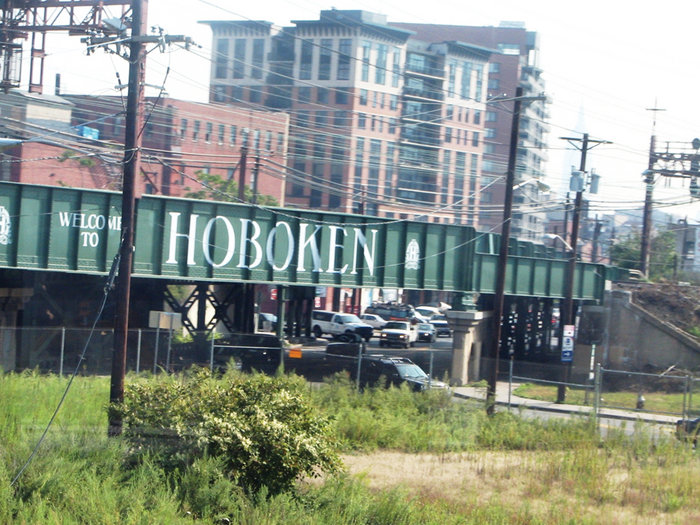Southwestern Hoboken will someday get a new look.
The Planning Board has released the long awaited Southwest Redevelopment Study, a 128-page document completed by Clarke Caton Hintz that makes recommendations about whether many of the industrial properties and underutilized plots of land close to the city’s southern entrance could meet the criteria for redevelopment.
Redevelopment is a designation given to an area found to be unsafe, overcrowded, or underutilized, among other qualifications. The city has the power to rezone the land, acquire property (sometimes through eminent domain), clear it, construct or reconstruct streets and utilities, create a development plan, solicit bids from developers, make loans to those developers, and “exercise other powers, including the power to do all things necessary or convenient to carry out its plans,” according to the study.
The study found that that approximately 75 percent of the properties in the 17-acre area meet the criteria for redevelopment.
Six-year process continues
The long road to the release of the southwest study began when the City Council authorized the Planning Board to determine if the area is in need of redevelopment on Jan. 19, 2006. After an investigation was finished and a public hearing was held on June 6, 2006, the area was deemed in need of redevelopment. The council voted to affirm the decision on June 21, 2006.
The first Planning Board hearing is scheduled for Feb. 2.
____________
The long-awaited study was expected to be made public in February 2011, but wasn’t released until earlier this month, effectively starting the next phase of the redevelopment process.
The study describes the 4th Ward as “a popular gateway to Hoboken from Jersey City and serves as a conduit for vehicular traffic seeking to access the Holland Tunnel to New York City,” according to the report. “Although there has been relatively recent redevelopment in the form of high-rise residential condominiums (i.e. Hoboken Grand, The Skyline), some downtrodden remnants of the city’s industrial past persist here.”
The next step in the process is for the Planning Board to hold special meetings and hearings so residents and property owners can give input on the future of the southwest.
The initial hearing is scheduled for this Thursday, Feb. 2 at 7 p.m. in the City Hall basement conference room. In case the need arises for extra hearings and sessions, Feb. 23, Feb. 29, and March 1 are also set aside.
A majority of the properties included in the area are either parking lots or small industrial or commercial businesses, such as a car wash or repair shop.
Currently, the zoning in the study area consists of two designations – mixed used industrial and revitalization residential district. The city can change the zoning through redevelopment to bring commercial or traditional residential development.
The study also recommends areas “in need of rehabilitation,” which do not allow for eminent domain to be used.
So how does it work?
“This is the starting point of the redevelopment process,” said Brandy Forbes, Hoboken’s community development director. “[The city will] study the area, determine if it meets the criteria of ‘an area in need of redevelopment,’ and to designate the area, if so.”
After the hearings are held, the City Council can vote on a resolution designating the area in need of redevelopment.
The council can prepare a redevelopment plan and submit it to the Planning Board for review, or the council can direct the board to prepare a redevelopment plan by resolution.
“The redevelopment plan is the primary document in the redeveloper selection process,” Forbes said, “as it defines the project and what the council is seeking from a redeveloper.”
After a plan has been put forth, the council can adopt the redevelopment plan by ordinance, which would effectively change the zoning.
So, how long until residents will see changes in their neighborhood?
“The time frame for preparing a redevelopment plan can vary, depending on the process and the amount of public input sought,” Forbes said.
Forbes said the redeveloper selection process can vary. Property owners do not have the automatic right to be designated as the redeveloper of the property they own, although there are cases where that choice makes sense.
“Redevelopers may be chosen as a result of unsolicited proposals, informal invitations issued by the city, or through a more formal, open, competitive process,” she said.
The purpose of the hearing for Thursday, Forbes said, is to hear testimony from professionals, answer questions of the board members, and to hear from all persons who are interested in or would be affected by a determination of a redevelopment area.
What about a park?
Mayor Dawn Zimmer has been working to put a park in her home ward since she entered politics in 2007. Zimmer said in her State of the City address that Hoboken will put a down payment on proposed park land by the end of this year.
Fourth Ward Councilman Tim Occhipinti, who represents the area of the city in the study, said he hopes that through the redevelopment process the city is able to acquire park land.
“I’ve advocated for a park in the southwest in both of my elections,” Occhipinti said. “I hope that redevelopment will be a tool to help us achieve that goal…I want to make sure the public gets necessary givebacks through development.”
Occhipinti and other city officials couldn’t comment specifically on what they want to see done in the study area, because they are required to wait until the public hearings begin.
The acquisition of a park is different from the redevelopment process, Forbes said.
“The city has had new appraisals done for the properties we are currently pursuing in the southwest and is finalizing an environmental phase one analysis of these same properties,” Forbes said. “With this information, the city administration can officially negotiate with property owners for acquisition. These negotiations are expected to be conducted in February and March.”
Ray Smith may be reached at RSmith@hudsonreporter.com
